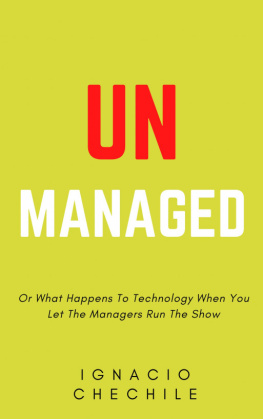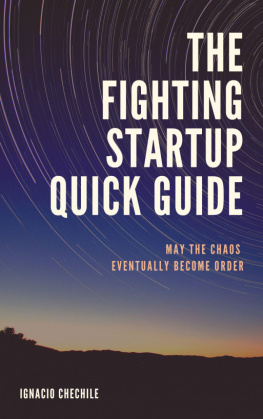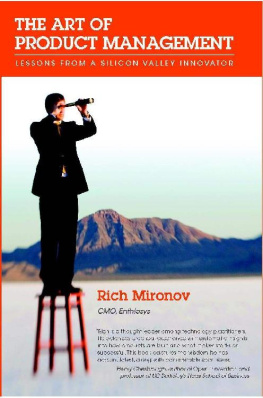Unmanaged
Or what happens totechnology when you let the managers run the show
Ignacio Chechile
All Rights Reserved2022
No Duplication Without Written Permission
Table of Contents
s
Introduction
In the frantic pursuit ofequity money, a merger or an IPO, at some point we forgot aboutdoing good technology and engineering. Once an activity whereexcellence, objectivity and a methodical approach were the norm,engineers have acquiesced to marketing departments, financiers andambitious sales teams taking the helm, offering products that donot exist in schedules that are impossible to meet for markets thatare just mirages. What is more, C-teams have embraced the practiceof flooding companies with managers with dubious credentials andinflated CVs. The result? Organizations that prioritize landing aheadline in specialized media over designing and developingproducts people need.
Every time a company goesbelly up, there are a myriad of post-mortem reports and in-depthanalyses written trying to explain, in total hindsight, what wentwrong and what could have been done differently. Companies do notdie all of a sudden in a dramatic final pirouette, but due to theprogression of small, incremental vices and bad practices that endup turning great ideas into failed corporations. This text is aboutdiscussing such wrongdoings with a colloquial tone and augmentedwith a dose of real stories. Fundamentally, this work figurativelyasks the next question: is it possible to develop good technologywithout managers? If not, how do we beat them in their owngame?
The book is a curatedcollection of essays repurposed into very short chapters, stemmingfrom the authors works at Managers Everywhere . Chapters are self-contained,which means you can freely jump between them back and forth withoutlosing context.
2022. Licensed underCreative Commons (CC BY-NC-ND 4.0). Free ebook. All references,figures and illustrations are credited according to the authorsbest knowledge at the time of publication. For corrections or anyother inquiries, please contact
ignacio.chechile@gmail.com
ISBN: 9781005015688
Chapter 1: The Future Belongs To TheManagers
On The Problem OfOverpopulation Of Managers
Managers who don't knowhow to measure what they want,
settle for wanting what theycan measure.
Russell Ackoff
At infinity, everyorganization tends to be exclusively staffed by managers. Which isa paradoxical theoretical final state: the moment everyone is amanager, no one is a manager. Sort of an organizational absolute zero , where no work is done anymorebecause there is no one left to lay any bricks.
In some ways, the managerialinflation is understandable: as growth ramps up, more people comein, more processes appear, more bureaucracy, more to be managed:people, papers, machines, systems, projects, products. The crowningspree goes nuts because theres an increasing urge to encapsulateand package complexity behind single faces.
Crowning managers is likeprinting money: can be easily done, but the implications can beuglier than the problem it may come to solve. As managers areminted much faster than leadership can be grown or taught, theresult is people with lengthy titles but low legitimacy, who are infact incapable of taking any relevant decision, being left to floatin a sea of peripherality and administrative chores.
Lurking behind theorganizational growth is the equivalent growing need of moreconsensus, and buy-in seldom comes from pulling rank. When doubtreigns, those with the scars and the knowledge, but also with theopenness and the charisma to support and guide others through theuncertainty will always be the ones sought after, regardless whatthe org chart has to say.
Chapter 2: The Mechanism
On The Art of MarketingBullshit
Build something 100people love, not
something 1 million peoplekind of like."
Brian Chesky
Someone I knowsomeone wecould describe as a struggling actresshas always dreamed about acareer in Hollywood. Although perhaps there isnt a morecompetitive industry on the entire planet, this did not stop herfrom pursuing her dream of becoming the next Scarlett Johansson.But in order to achieve such a dream, there was a bureaucratic, notso glamorous, yet crucially important factor between her and heracting career: getting a H-1B Visa so she could settle in LosAngeles. The H-1B visa is targeted for highly achieved individuals,also applicable for foreign talented engineers, scientists, medicaldoctors and whatnot. When it comes to the fine arts, in order to beeligible for such a permit, you must demonstrate that you are,well, kind of an accomplished person wherever you come from, or atleast show there is some sort of paper trail behind you. In otherwords, you must provide evidence about what you have done. Whatpaper trail the visa processing authorities look for? Anythinghelps, but there isI learneda strong reliance on specializedmedia. This means, showing that different publications in the finearts arena are talking about you and how great your work is.
But this persons careerback in her country was not what you could call preciselyextensive. Was this a party-pooper at all? Of course not: becauseshe knew someone who knew someone who knew someone, she managed tocreate a critical mass of nicely crafted articles in arty mediaportraying her as the next Julia Roberts. Long story short, shemanaged to get the visa, and althoughnot surprisinglyher gig hasproven to be quite difficult, shes finding her way, because shedefinitely has talent.
Now, it is not real news(pun intended) the role media plays in the hype cycle. We know thedrill:
1. Something bombasticallyworded is published for the benefit of someone
2. Piece is picked up by adecision maker who does not bother to scratch beyond the surfaceand buys the words to the beat
3. Goto 1
Specialized media acts asthe substrate, the vehicle on top of which all this takes place.All while holding absolutely no accountability; cashing in andstaying safely aside if eventually theres a carnage down the roadbecause of the content published.
Space industry is a classicuser of The Mechanism: a random company gets anusually paidpiecein some popular publication announcing something along the latestfad: small launchers, Orbital Transfer Vehicles, machine learning,artificial intelligence, blockchain, funding, oreven betteracombination of all that. Or, an already established actor announcesa new factory of thousands of square meters to be built somewherein order to manage the insurmountable peak of demand they areexperiencing so they can mass produce whatever they do, thousandsper year. Always adding fancy rendersand casually forgetting toclarify they are rendershoping the textures are right enough foran untrained eye to confuse them with something real. Mostly nodsto budget trigger-happy defense and space governmental entities whoare surely watching. You feel like the third wheel reading allthat.
In cases, opaqueorganizations may join forces and go out together with pieces wherethey announce flashy partnerships which tend to describe a longstretch between what is being announced and the actual traction ofthe announcers, for example: Humbug Space Systems and HofstadterLaunch ServicesSign Partnership for Sending 10 missions To Jupiters MoonEuropa. Does this prevent some investorssmall or bigfromabsolutely loving it because InNoVaTioN and start throwingmoney at that, although most likely nothing will ever materialize?No it does not.
All over the Internet, thereis a growing ecosystem (to use a polite word) of highly dubiousdigital newspapers whose main objective is to place ads all overthe place. In these, you can find every single day clickbaitarticles such as: Chinese man eaten alive by a Komodo dragon. Thecurious event always happens very far away, in very distant regionsor rural areas of remote countries. Nowadays they do not evenbother to add any source, news agency or anything. Who checks ifthere was actually a poor man munched by a reptile somewhere?Nobody does of course, and thats the beauty of it. But clickbaitis clickbait, they dont try very hard. What you see is what youget.










